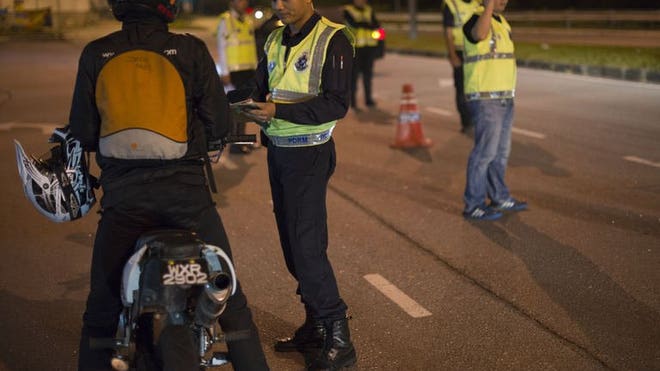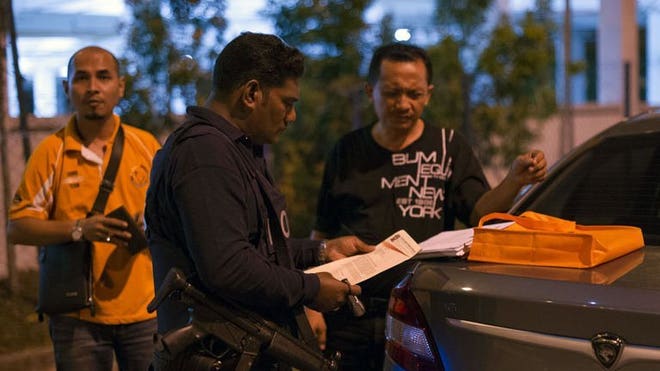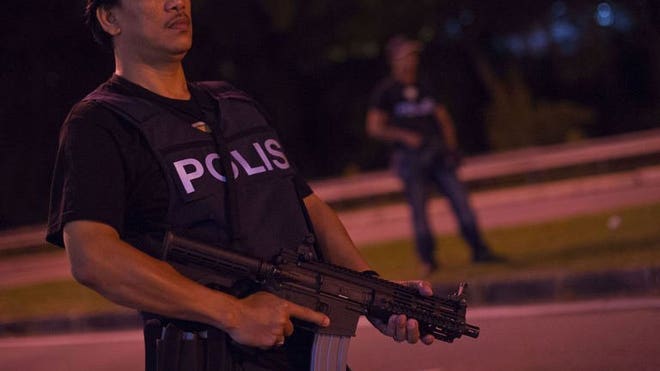Crime wave puts laid-back Malaysia on edge
By Dan Martin
Read more: http://www.foxnews.com/world/2013/08/21/crime-wave-puts-laid-back-malaysia-on-edge/#ixzz2ckVeQ2Hw
KUALA LUMPUR (AFP) – A wave of lethal shootings is rattling normally laid-back Malaysia and raising fresh doubts about the ability of the much-maligned national police force to protect the public.
Malaysians and foreign residents alike have long complained of burglars, bag-snatchers and other petty criminals operating with apparent impunity in the otherwise peaceful multi-ethnic nation.
But near-daily gun violence in recent weeks in a country with tough firearms restrictions has sown fear and confusion, and triggered a weekend police crackdown widely considered long overdue.
"To be honest, I am really scared," said French expatriate Marthe Buffiere, 29, whose hand was nearly severed last month in a mugging by two knife-wielding assailants in an upscale Kuala Lumpur neighbourhood.
"The image of wealth and safety here is totally untrue," said Buffiere.
Dozens of shootings have been reported since April, many fatal, but the causes and the culprits in the sudden upsurge remain unclear.
Home Minister Zahid Hamidi, who oversees the national police force, believes there is a turf war involving 2,600 criminal suspects released since 2011 when the long-serving government was pressured into abolishing a controversial law allowing preventive detention.
"Each has his hardcore followers. If each of the released detainees had 10 right-hand men, this translated to 26,000 who are with them," he said.
But the opposition dismisses that as a smokescreen to hide police ineptitude, while social media hum with darker conspiracy theories of battles between corrupt police factions and their underworld proxies over criminal rackets.
The crisis is fuelling calls for reform of the Royal Malaysia Police, which has long been dogged by accusations of corruption, incompetence and bias toward the regime which has been in power for 56 years.
"There is not a strong enough deterrent. If it seems you can get away with crime, criminals will try, and they are," said Richard Wee, chairman of Safer Malaysia, a grassroots group pressing for improved policing.
"And (police) corruption is the big elephant in the room."
Zahid has not backed his turf-war claim with evidence. Neither he nor top police officials responded to requests for comment.
Whatever the causes, citizens are forming community patrols and barricading entrances to neighbourhoods while anti-crime websites feature videos of angry mobs beating suspected criminals.
"The public is fed up, distraught, and angry and are resorting to vigilantism," said Mark Soh, who runs the Malaysian Crime Awareness Campaign's Facebook site, a hotbed of crime chatter.
Singaporean media reports have said many travellers from the city-state, a major source of tourist spending, were putting off plans to visit neighbouring Malaysia, but there has been no hint of a broader economic hit yet.
The latest burst of deadly shootings began late last month, with victims including a Bahrain-born businessman who founded one of Malaysia's biggest banks in the 1970s.
Hussain Ahmad Najadi, 75, was gunned down on July 29 on a Kuala Lumpur street in a still-unsolved crime, prompting Prime Minister Najib Razak to demand that police act to "restore public confidence".
But a daily drumbeat of brazen robberies, carjackings or killings has rolled on.
With public pressure growing, police on Saturday launched an operation to corral "suspicious" people, detaining 200 so far and killing five suspected gangsters in a shootout.
Ruling-party conservatives who oppose a cautious reform drive launched in 2011 by Najib have blamed it for the chaos and urged a harder line on security.
But the opposition counter that urgent police reform is needed, citing figures showing just nine percent of police are assigned to criminal investigation compared with far greater resources focused on political threats or mundane desk work.
The force has also faced increasing criticism over the deaths in custody of more than 230 people since 2000, the vast majority going uninvestigated.
The mentality of the police force is little changed from its early years fighting a failed communist insurrection in the 1950s, said opposition legislator Liew Chin Tong.
"Most other countries have modern police forces. Ours is still stuck in the Cold War," he said.
Najib, whose government has prompted scepticism with data showing crime has plummeted since 2011, has made no mention of police reform.
Instead, he is promising strong new anti-crime measures that will respect civil liberties.
"The prime minister has made tackling violent crime a priority, and has said that all resources needed to fight crime will be made available," a Malaysian government spokesman told AFP.
Accountant Latifa Hanan, 30, hopes police will gain the upper hand.
The Kuala Lumpur resident has been mugged twice this year and all her closest friends have also been victimised.
"We're all wondering what's happening to our lovely country," she said. "Even going out in daytime, you feel like you have to watch your back."
Read more: http://www.foxnews.com/world/2013/08/21/crime-wave-puts-laid-back-malaysia-on-edge/#ixzz2ckVaPs5D





No comments:
Post a Comment